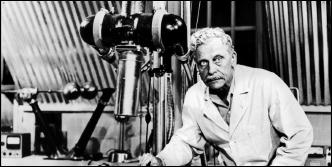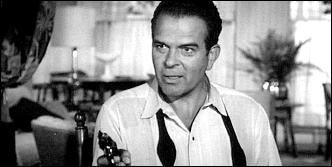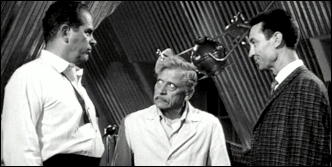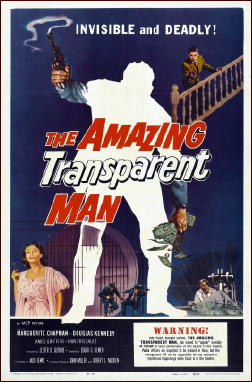Sun 6 Jul 2014
A Sci-Fi Movie Review by Jonathan Lewis: THE AMAZING TRANSPARENT MAN (1960).
Posted by Steve under Reviews , SF & Fantasy films[5] Comments
THE AMAZING TRANSPARENT MAN. American International, 1960. Marguerite Chapman, Douglas Kennedy, James Griffith, Ivan Triesault, Red Morgan, Cormel Daniel. Director: Edgar G. Ulmer.
The Amazing Transparent Man is a low budget science-fiction film directed by Edgar G. Ulmer. As you might expect, there’s an evil villain with a dim henchman, a semi-mad scientist, and a guy and a gal caught up in the whole mix. Not to mention an uncredited guinea pig with the privilege of being made invisible first.
Although The Amazing Transparent Man is not a particularly good film, it undeniably has its moments and low budget charms. While the acting is overall unmemorable, the special effects are actually fairly decent and the cinematography is quite good, particularly for an early 1960s science fiction B-film. The film’s music by Darrell Caluker, especially the eerie sequence during the opening credits, isn’t bad, either. In fact, it’s pretty haunting and worth listening to, even if you don’t make it through the rest of the movie.
The plot is fairly straightforward, although awfully bleak if you actually stop and think about it. Bank robber Joey Faust (a mean-looking Douglas Kennedy) breaks out of prison and is picked up in a car by Laura Matson (Marguerite Chapman). She drives him to the home of Major Paul Krenner (James Griffith), who is holding German émigré scientist, Dr. Peter Ulof (Ivan Triesault) and his daughter hostage. Ulof mentions to Faust that the Nazis forced him to perform experiments in concentration camps, including unbeknownst to him, on his then wife. It’s all sorts of depressing.
Krenner has been forcing Ulof to experiment with nuclear materials, with the ultimate aim of creating an army of invisible soldiers. It’s a plan that strains credulity, even for a science fiction film. The major’s plan is to have Matson and his henchman, Julian (Red Morgan) hold the fugitive Faust hostage, turn him invisible, and have him steal more nuclear material from a tightly guarded facility nearby.
But the scheming Faust has other ideas. He realizes that invisibility has its advantages in the high-risk profession of bank robbery, and he convinces Matson to drive him into town for a heist. Problem is: the nuclear material providing him his new power was unstable, leading Faust to fade in and out of visibility, allowing bank employees to identity him. Faust and Matson then flee back to Krenner’s house in the country, where Faust and Krenner fight.
Then all of a sudden, the whole place blows up in an atomic cloud, leaving you not feeling particularly sorry for anyone but the guinea pig. Dr. Ulof survives, but it doesn’t much matter since he’s dying of radiation poisoning. It’s an ending that I certainly didn’t expect , and it made the whole mediocre affair a much darker film than many other movies of its kind.
In conclusion, Joey Faust is one mighty doomed protagonist. Looks like the tough guy would have been better off staying in the big house after all. But then again, there wouldn’t have been any movie had he done so.




July 6th, 2014 at 7:15 pm
I remember a TV programme called DENNIS NORDEN’S TRAILER CINEMA, where he showed a load of old B-movie trailers. When he showed the one to this, he added “And to all of those who remember the original INVISIBLE MAN, please don’t think ‘rip-off’ or ‘plagiarism’. Say, rather, creative reuse of the concept…”
July 6th, 2014 at 7:29 pm
I’m afraid even Claude Rains couldn’t have saved this film from what it ended up as
July 6th, 2014 at 7:36 pm
I’d have to agree. I was surprised to see how well done the special effects were. The story, not so much.
July 7th, 2014 at 3:03 am
Ulmer did some brilliant films, but this ain’t one of them.
July 7th, 2014 at 3:46 pm
Douglas Kennedy wasn’t the only thing transparent in this one.